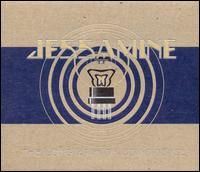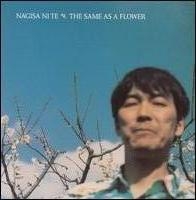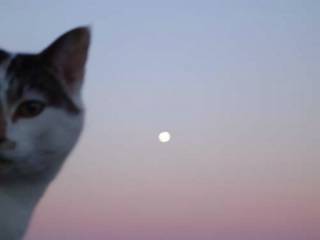2004 is simply a watershed year in the experimental/psych underground, but then I said something similar last year. A few more reasons why: The free folk impressionism of
Päivänsäde, a Finnish ensemble that deftly defies categorization. On the limited
Tamminauhat/Tulipesä - Tapes CD-R (edition of 150, impressively packaged in green corrugated cardboard on the Dutch Whistle Along label) the ensemble conjures forest ghost symphonies from ethnic noise makers, shakers, flutes, chimes, bowed saws--all strikingly captured live. I don't really hear any guitars, but I think they're in there too. An intense yet subdued drone clamor where the instruments blend into dense aural shafts of light that pierce the morning mist.
Puhalluspelto,
their vinyl debut for the always dependable Eclipse Records, is more readily available and probably a more dynamic slab of their fractured folk groove. If the debut CD-R is ghostly and "ambient,"
Pulalluspelto's 9 tracks take on a wider variety of improvisational peaks and valleys, from the barely there opener to the awesome tribal stomp of "Sadelkaa Meneen"--equal parts No Neck Blues Band and Yahowa--and there's even some ethnic jazz that any Sun City Girls freak could dig into.
Got my hands on an advance copy of
Isis's Panopticon (Ipecac), and I'll say here and now it's their best album, maybe the finest heavy metal trance inducer since
Spiderland. Has a similar meditative quality, but it's a massively produced in its own right. Fantastical drone METAL from Aaron Turner and friends (his solo guise,
The House of Low Culture, comes highly recommended for those enamored of Labradford, Main, Coil and other drone-scapists) for fans of Swans, Godflesh and even Mogwai.
Volcano the Bear released one of the scariest records I heard in the last few years in
The Mountains Among Us (Beta Lactam Ring), and though they can be a bit hard to get into, I've never been disappointed with any of their albums. Still fans of their more whimsical side, and there is one, will probably be happier with
Guignol, and particularly
The One Ensemble of Daniel Padden, offering a slightly sunnier kind of experimental folk psych soundtrack music, which as heard on
The Owl of Fives (Textile) and the self titled debut (Catsup Plate) makes me more content then the fattest bowl of the dankest dank, with acoustic guitars, piano and violin conjoined as soul-searching meditative journeys. Swinging further out on the experimental vine are
Tetuzi Akiyama, Tim Barnes and Masutfumi Ezaki on
Futuro (Quakebasket), a live performance captured at Cafe Futuro in Osaka at the end of 2003. It's an extended journey through some very out free jazz clatter that won't sound too off the beaten path to those who've fallen in love with Japan's Onkyo music scene. Space plays a large part here, as tension is poked and prodded from a variety of oblique angles with Akiyama's random jarring strikes and squiggles on guitar conversing with Barne's subdued percussive clatter and Ezaki's unconventional trumpet "playing." Difficult is an understatement, but the rewards are there for the patient headphones listener and fans of avant folk and other "free musics".
Faktory is the
Futurians official debut CD, this time for Soft Abuse, recently relocated from Florida to New york, which given the relative grime factor of a release like this one, might make sense. Still, that beautiful
Sky Green Leopards record had a decidedly more equatorial vibe to it, and these days Florida is about as violent as a Futurians song anyway! Think it's bad now, wait till November. These New Zealanders don't like to fuck around too much with things like mic placement or mixing, though
Faktory does somehow manage to sound different than all of their other albums--more compressed and fucked up at the same time--resulting in a totally putrid hybrid of bubblegum punk and no-wave scunge that's gonna appeal to Wolf Eyes and X-Ray Spex fans alike and scare away most everyone else. The doomed synth dirge "Big Fish" plays out like the apocalypse stuck in a time warp.
Down shifting to another New Zealander of much note,
David Kilgour never wastes my time, and
Frozen Orange (Merge) is yet another brilliant collection of meditative psych and indie pop that features at least three different classic tunes in gems like "Living In Space," "Rocket" and particularly "Head Full of Rolling Stones," a tribute to a band and an attempt at the perfect escape. No one can write a heart-surging fuzzy sing-along like Kilgour, and he does it here repeatedly. Guess it's no surprise that
Aerial Pink's Haunted Graffiti 2's The Doldrums comes via the
Animal Collective's label, Paw Tracks. The results are a sticky glob of fuzz pop and beat-boxed percussion. Yes, apparently all the drum sounds come from this guy's mouth, lending things a definite cracked rhythmic base for some mightily damaged fuzz pop that I've had trouble getting my head around, and I usually love this sort'a stuff. The jury's still out.
No such reservations with
Greyscale's Cruel Machine, another solid signing for the head-trippers at Australia's Camera Obscura. Silver liquid flows through these expansive drone instrumentals all doused in a fine shimmer of delay with guitars, pedal steel, bass, synth and percussion, and some industrial found sounds, weaved into a graceful meandering drone psych spell worthy of Grimble Grumble, Paik and Bardo Pond, though leant a more Southwestern touch with the pedal steel.
The High Lonesome Sound of The Satyrswitch on the other hand sees Minneapolis musician Jason Kesselrin (also of
Sky Klad) unleashing a slightly twisted take on traditional folk and raga with vocals that fall somewhere between Syd Barrett and Lee Hazlewood. So yeah, it's gonna make a few people crinkle their faces, but his busy, dexterous fingers do plenty of talking too, and I personally don't mind a little twang. Color me seduced.
Very happy Thrill Jockey re-released (as an expanded CD with the
Wayne EP)
Prairie School Freakout by
Eleventh Dream Day late last year. The '88 LP is arguably the high point of this storied band's career. Recorded live with basically no overdubs, it's the sound of a young group kickin' out the jams hard and fast, fully indulging in its love of Neil Young/Crazy Horse, making it ripe for hippie punks who dig the rockin' parts of Yo La Tengo albums and the so called Paisley Underground.
Plastic Crimewave is the freakizoid behind the excellent
Gallactic Zoo Dossier fanzine, as well as an underground rock god in his own right. The self-released
Blinding Pink Sun CD-R is a collection of solo live recordings which sees him stepping away from the full band psych of previous releases and directly into the pink sun void with delay drenched guitar-scapes that fall somewhere between Mathew Bower's early work in Total, Fushitsusha and a languid solar wind storm.
Finally, the new
LSD-March album,
Kanashimino Bishounen on HP Cycle is a fucking monster, or at least every bit as worthy of my time as their recent CD on Last Visible Dog. Garagy guitar psych enthusiasts who like it raw and burnt will find their skulls effectively (and blissfully) decimated by the seductive fury of this trio.




